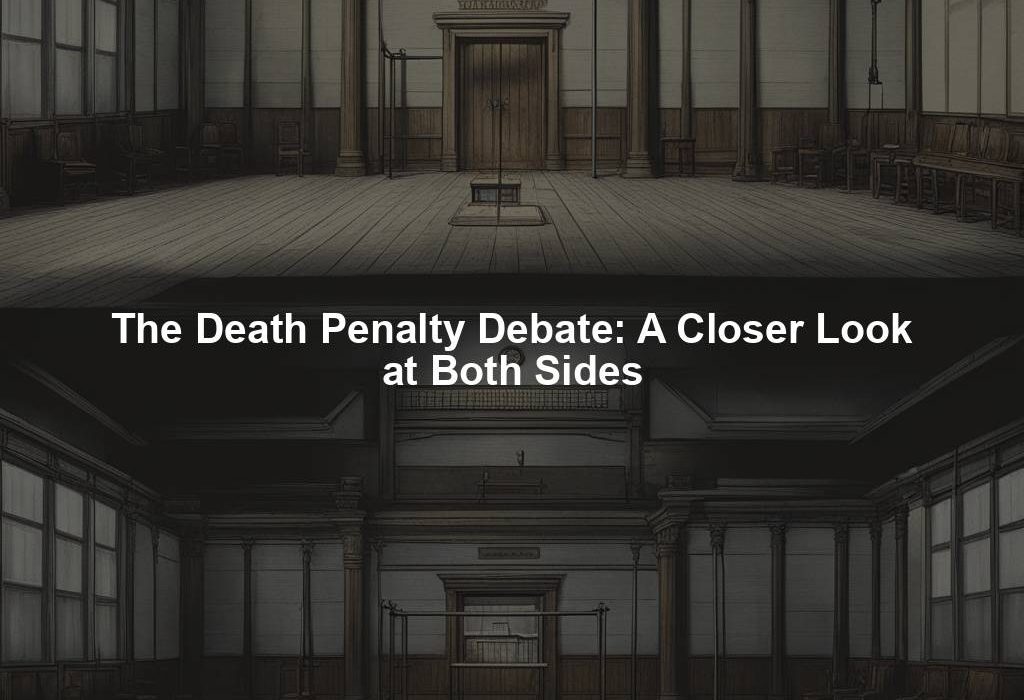The Ethical Divide: Examining the Polarized Perspectives on Capital Punishment
The death penalty, also referred to as capital punishment, stands at the center of a contentious and longstanding ethical debate that transcends generations. Advocates assert its efficacy as a deterrent for extreme crimes, while detractors denounce it as dehumanizing and ineffective. This article delves deep into the dichotomous discourse surrounding capital punishment, shedding light on the arguments both in favor and against this practice.
Supporters of the death penalty often highlight its purported deterrent impact as a primary rationale for its retention. They contend that the fear of facing death penalty repercussions dissuades potential offenders from committing grave offenses like murder. In a 2012 study by the National Research Council, researchers identified indications suggesting that the death penalty does discourage criminal activities. The study revealed that each execution prevents an average of 18 murders, potentially saving lives in the process.
Moreover, proponents of capital punishment argue that it offers a semblance of closure and retribution for the bereaved families of the victims. Many families of homicide victims yearn for resolution and a sense of justice that can only be attained through the execution of the culprit. In instances of heinous crimes such as mass killings or serial murders, advocates posit that the death penalty represents the sole fitting form of punishment.
Conversely, opponents of the death penalty counter that it is fundamentally harsh and inhumane. They argue that no governing body possesses the authority to terminate the life of another individual, irrespective of the transgression committed. As per the Death Penalty Information Center, numerous instances have surfaced wherein innocent individuals were erroneously convicted and condemned to death. Since 1973, over 160 individuals in the United States have been exonerated from death row due to evidence exculpating them.
Additionally, adversaries of capital punishment underscore the manifold racial and socioeconomic inequalities inherent within the system. Research indicates that African Americans and other marginalized groups are disparately sentenced to death in comparison to their white counterparts. A report from the American Civil Liberties Union underscores that African Americans constitute a significantly larger proportion of death row inmates than their representation in the general populace.
The financial ramifications of the death penalty also serve as a prominent bone of contention for opposers. According to a study by the Death Penalty Information Center, capital punishment proves markedly costlier than life imprisonment devoid of parole possibilities. This heightened expense is attributed to the protracted appeals process, the upkeep of death row inmates, and the overheads associated with executing death penalties. Jurisdictions that have abolished capital punishment redirect the accrued savings from eschewing this practice towards bolstering crime prevention initiatives and enhancing victim services.
Notwithstanding these contentions against the death penalty, staunch supporters persist in viewing it as an indispensable punitive measure for society’s most perilous offenders. States where the death penalty remains operative institute stringent protocols and oversight mechanisms to ensure its equitable and judicious implementation. Nevertheless, the underlying query lingers: does the death penalty genuinely function as a crime deterrent and a vehicle for justice?
In conclusion, the debate encircling the death penalty is intricate and multifaceted, replete with valid contentions on either end of the spectrum. While advocates uphold its prowess as a deterrent and a means of redress for victims’ kin, adversaries decry its inherent cruelty, racial biases, and exorbitant costs. The responsibility rests upon policymakers and society at large to balance the merits and demerits of the death penalty and determine its continued integration within our criminal justice framework.
Sources:
– National Research Council. “Deterrence and the Death Penalty: A Critical Review of New Evidence.”
– Death Penalty Information Center. “Innocence.”
– American Civil Liberties Union. “Race and the Death Penalty.”
– Death Penalty Information Center. “Smart on Crime: Reconsidering the Death Penalty in a Time of Economic Crisis.”




